
















The 2025 Rotary Presidential Peace Conference led by RI President Stephanie Urchick in Istanbul, Turkey, during February 20–22, 2025, will be an opportunity for the Rotary community and partners to build on Rotary’s contribution to promoting peace by exploring: Peace in a polarised world; Technology, media and peacebuilding; Environmental issues in peacebuilding; and Making peace last.
The conference will also recognise the launch of the new Otto and Fran Walter Rotary Peace Center in partUniversity in Istanbul.
The three-day conference includes keynote speakers, panel discussions and breakout sessions that will highlight the many ways Rotarians and community leaders can advocate for peace; share stories, insights and ideas about building peace locally and globally; and foster meaningful conversations on promoting peace within our communities and beyond.


kout sessions that will and
Visit www.rotary.org/istanbul25 to register for the Peace Conference and book your accommodation. Email: Istanbul25@rotary.org
Conference venue: Hilton Istanbul Bomonti Hotel & Conference Center






RI Director Anirudha Roychowdhury
RI Director Raju Subramanian
District Rotaract Representatives 2024–25 Zone 4, 5, 6 & 7
Gowtham S
Srinivasan Shanmugavel
Geetika
Kaavya Jain
Machi Lakshman Rapeti
Sachin Shrikisan Purwar
Nikunj Goydani
Pavitra Tiwari
Rushil Shah
Jimmy Saraf
Rohit Ashish Ajmera
Sukhpinder Kaur
Shashank Kaushik
Sahil Jindal
Aayushi Agarwal
Suryansh Agrawal Sr
Kamadeshwar Singh
Drishti Singh
Rohit Baban Chavhan
Nikhita Sunil
Nisha Raju
Vineela Siddineni
Nagarjun Karnatakam
Nikhil Ramesh Chindak
Sanjay R
Chethan Kumar
Abhay Lohia
Surya Kiran K
Thanghapantieyaan AK
Tamilarasan Mani
Juvana Jasmin K
Mohamed Safiullah Jahangir Ali
Sanjana Varma
SasiKumar Janakiraman
Aloka Dey
Rinku Kumar
Rahul Singh
Shehneela Khan
Editor
Rasheeda Bhagat
Deputy Editor Jaishree Padmanabhan
Senior Sub Editor Muthukumaran V
Sub Editor
Kiran Zehra
Administration and Advertisement Manager Vishwanathan K
Designers
Gunasekaran L Krishnamurthy N Krishnapratheesh S
Send all correspondence to ROTARY
3rd Floor, Dugar Towers, 34 Marshalls Road Egmore, Chennai 600 008, India. Phone: 044 42145666 e-mail rotarynewsmagazine@gmail.com facebook @RotaractNewsIndia twitter @Rotaract_India instagram @Rotaract_India website www.rotaractnews.org
Published by Rotary News Trust from Dugar Towers, 3 rd Flr, 34,Marshalls Road, Egmore, Chennai 600 008.
The views expressed by contributors are not necessarily those of the Editor or Trustees of Rotary News Trust (RNT) or Rotary International (RI). No liability can be accepted for any loss arising from editorial or advertisement content. Contributions – original content – is welcome but the Editor reserves the right to edit for clarity or length. Content can be reproduced, but with permission from RNT.

Editor’s Note








The best part of the Kochi Zone Institute convened by RI Director Anirudha Roychowdhury and chaired by PDG John Daniel was reserved for the last. It was the delicious sadya feast — a traditional, elaborate Kerala meal — the participants were given for lunch on the final day. For one, it was a huge relief to have a meal while seated; where is the fun in holding onto a heavy china plate, balancing the food, spoon and fork on it, while standing? Served on the banana leaf, the aroma wafting from the delicacies served, combined with the flavour of the leaf, to satisfy the most demanding palate. Not only was the food served delicious, it was the manner and love with which it was served that bowled over the participants. The women serving the extra helpings hovered around you, keeping a close watch on the disappearing items from your banana leaf and offered to refill it with a warm smile. It felt like every guest was a mappillai (groom) at his own wedding! The appams at breakfast were perfect too!
for TRF, or service projects, the fuel which fires the imagination of so many Rotarians, they were all there. The Kerala flavour came through from the line-up of mock elephants, chenda melam performances, Keralastyle street food and backdrops for memorable photo opportunities.




Now that credit has been given to the most important aspect of any event — food — Team Kochi members were found hitting the ball out of the park on other aspects as well. Take for instance, transport, which is a major headache at many Rotary events. Even though one can understand the dilemma of the organisers handling a huge number of delegates, the 1,200-odd delegates in Kochi found that the wheels carrying them from various hotels to the venue and back, as also airport and railway station transfers, rolled smoothly and without glitches.
I’m sure it must have taken a lot of brainstorming and executing skills to achieve the results, but at the end of the day, this Institute had an eclectic mix of events to satisfy every taste, passion or preference. Whether it was the entertainment, either during the sessions or laced with the right mix of spirits in the evenings, sporting activities like the traditional Kerala snake boat race or the half-marathon to raise funds

Last, but not the least, the choice of speakers, gave the RNT team some interesting speeches to report on. Environmentalist Sonam Wangchuk, even though he took a mild potshot at the unnecessarily excessive air conditioning in the hall where the main plenary was held, was brilliant in the simplicity with which he spelt out the grave challenges we were inflicting on Planet Earth by such thoughtless acts, that triggered catastrophic consequences in the high Himalayas where he lives. Parliamentarian and Kerala boy Shashi Tharoor regaled the audience with his wit and charm — a woman delegate who had to leave urged me to send her a video recording which I declined of course — in a Q&A session where he successfully deflected a few googlies bowled by his interrogator PRID A S Venkatesh, with intelligent and fact-filled answers delivered in his impeccable diction and near-perfect English. Nobel Peace laureate and champion of children’s rights Kailash Satyarthi held the audience spellbound with his heartfelt appeal to remember that “every child and every childhood matters”.
The choice of the venue — Grand Hyatt Kochi, a waterfront luxury resort overlooking the backwaters of the Vembanad Lake, gets full marks too. The service the hotel staff offered was exceptional, complete with sparkling clean and stink-free women’s loos at the event venue.
There were 50 Rotaractors participating in the Institute, including DRRs, DRRs-elect and nominee.
Rasheeda Bhagat

Kiran Zehra

n Delhi’s Sangam Vihara a father decided to cancel his 15-year-old daughter’s wedding and send her back to school. This shift came after he attended a child marriage awareness session organised by the Rotaract Club of Delhi Pharmaceutical Sciences and Research University (DPSRU), RID 3011. The session, part of the club’s Project Shakti, highlighted the far-reaching consequences of child marriage on health, education and economic stability. It also clarified the Child Marriage Prohibition Act and the Right to Education Act, emphasising the penalties for violations and the rights of every child to a full
V daughte school. This shift cam awareness organ Pharmaceutical Sciences RID 3011. The session, the far-reach on and the Child Marri to Education violations an education.
“Throug gro sitised pe o club’s p Fo practica a an NGO t challenge continue support s rooted in h
“Through interactive methods such as street plays and group discussions, the programme sensitised the people living in the slums on how early marriage limits opportunities and perpetuates cycles of poverty,” says Shagun Azad, the club’s past president.
For this father, “the programme’s practical approach made a difference. While raising awareness, the club connected him to an NGO that could help address his financial challenges, ensuring his daughter could continue her studies. This comprehensive support system empowered him to decide rooted in hope for his family’s future,” he adds
The in national efforts s
India’s Beti Beti

The initiative also highlighted global and national efforts such as UNICEF’s 2030 agenda and Beti Bachao Beti Padhao campaign.
On World AIDS Day, Project Red Ribbon Walk and Talk was organised to spread awareness about HIV/AIDS and combat associated stigma. Supported by the AIDS Control Society and led by HIV Officer Dr Richa H Roy, the initiative combined a campus walk with a door-to-door campaign across 12 Delhi slums, reaching over 1,000 people. Volunteers distributed educational pamphlets, addressed
On World AIDS Day was combat associated stigm led HIV w across 12 Delhi slu Volunteers distribute

Above: Club members and volunteers form the shape of a human heart to raise awareness on HIV/AIDS.
Right: Club members collect plastic waste at a cleanliness rally.
myths, and encouraged inclusivity. The project cost `5,500 and won the RID 3011 People’s Choice Project Award.
Under Project Prakriti, the club carried out plantation drives, cleanliness initiatives, and visits to animal shelters, planting more than 100 saplings and encouraging environmental responsibility among residents. These initiatives were supported and sponsored by Vriskshit Foundation and Scrap Buddy. “Our work has earned
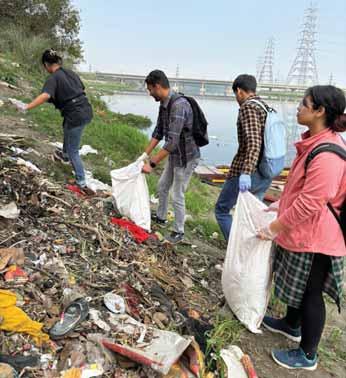


recognition from RSAMDIO and SEARIC MDIO,” smiles Azad.
During the club’s Navratri charity lunch with underprivileged girls at the SK Children Foundation in Preet Vihar, Delhi, the club organised a Kanjak, a traditional ritual honouring young girls as an embodiment of the goddess. The celebration involved distributing food, gifts, and traditional chunaris (pieces of cloth). “Girls were encouraged to share their aspirations, with one young girl expressing her dream of becoming a teacher,” he smiles.
Through Project Atmarakshak, over 750 girls were empowered after participating in self-defence workshops. Drawing inspiration from IPS officer Kiran Bedi, Project Ekagrata introduced yoga and meditation sessions in schools across Delhi. “These sessions, now conducted monthly, provide students with essential tools to manage stress and maintain emotional balance in their lives,” says Mohammad Affan, a club member.
A community library with over 250 books was established at an underprivileged school under Project Kalam. Bags and notebooks were distributed to the students.



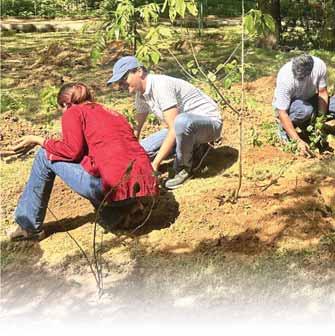
In a bid to combat air pollution and promote environmental sustainability RAC Meraki, RID 3011, has initiated Project Sanrakshan, focusing on environmental protection and conservation. Focused on increasing green cover and raising awareness, the initiative is a step towards improving Delhi’s air quality.
The first phase of the project, titled Taru Mitr (friends of trees in Hindi and Sanskrit), included a plantation drive on Friendship Day. In collaboration with the Delhi Development Authority (DDA), over 200 saplings were planted at the DDA Park, Govind Puri. “Trees play a vital role in filtering air pollutants and releasing oxygen, and the park caretakers have committed to nurturing the saplings to ensure their growth and long-term impact,” says club member Arushi Singh.
Beyond tree plantation, Project Sanrakshan also emphasises education with plans to conduct online sessions, physical drives, and studentfocused activities. These efforts aim to build awareness about the importance of environmental conservation and inspire collective action for a cleaner, healthier city.












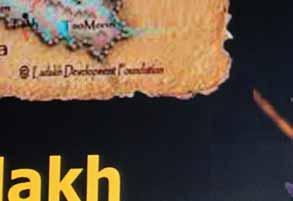
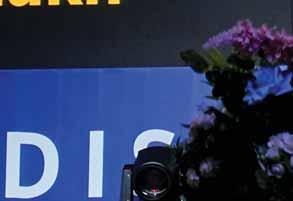








Rasheeda Bhagat


Ithis subject in their discourse and makes it a priority.”


n a world where violence and conflicts are tearing apart nations and wars are being waged in different parts of the world, environmentalist Sonam Wangchuk left the participants of the Kochi Institute with a different thought when he said: “when we talk about world peace, today’s problem is not the huge war going on between nations but between man and nature. I believe that the World War III is already on between human beings and nature.”
He proved his point with statistics. Every year, seven million people die of air pollution alone. If you add other climate-related deaths, it’s 10 million people. “I was thinking
what does this figure of 10 million people mean… what is this number? I naturally thought of the two big wars, World Wars I and II, which together lasted roughly 10 years. Around seven million people died from them, but from reasons related to environmental degradation and pollution we lose 10 million every year. This means World War III is already on.”


But the answer to this huge problem will not come from “solar-heated buildings or electric vehicles or technology in any form. The answer has to come from the whole discourse changing, and when religious leaders, who people listen to…. nobody listens to scientists… will take up

But even better than that, he said, was that “we become once again nature worshippers, as we were before any religion came.” He hastily added that for this we didn’t have to give up our current religions, but just tweak them a little and “become an adapted, updated version of Hindu, Muslim, Christian or Buddhist nature worshippers, and that will show us the light.”
Calling for adapting to a lifestyle that takes care not only of “our future but also that of the rest of beings who share this planet with us,” Wangchuk said the answer to the problems of today’s world lay not “in the blind rush for growth and development of the kind we have seen in the last 300 years; more of that will only get us further down.”
He would seek the answer from the Indian traditional wisdom and what the Buddha had said 2,500 years ago, that “a human being’s success lay not in fulfilling one thousand desires, such as the best of cars, houses, clothing and material wealth, but the elimination of a single desire, rather than its fulfillment. That is the kind of innovation we need on this planet, not technological or of the engineering kind.”
The founding-director of the Students’ Educational and Cultural Movement of Ladakh (SECMOL), on whose life experience Aamir Khan’s role as the scientist Phunsukh Wangdu in the Bollywood blockbuster The 3 Idiots was based, mesmerised the Kochi Institute audience with his profound talk that was wrapped up in stark simplicity and plain speaking.
To begin with, the environmentalist who lives in the fragile ecoregion of Ladakh, took a potshot at the super cool auditorium where the Institute

In order to combat the challenges posed by the climate crisis created by environment degradation in the high Himalayan region, “we are trying our bit in Ladakh to adapt and innovate to mitigate the impending disaster.
For the last 35 years at our school, we are trying to innovate ways to adapt locally. But today we need to adapt and innovate globally. Our little interventions alone will not help,” said noted environmentalist Sonam Wangchuk, addressing the Kochi Institute.
Started in the 1990s to bring reforms in the education system, “where failure was a big thing, it tries to prepare young people for a future that is very different from the past.”
This (SECMOL) school was built with natural materials like mud or earth, found right under our feet. And it is powered by the sun. In an extremely cold place like Ladakh, no energy, fossil or otherwise, is used to warm this school in winters or even to cook. Everything happens with solar energy in this school, which he said is perhaps the first carbon-neutral school in the world.
But that is not the most important issue, said Wangchuk. The
students learn by living and experiencing things and solving hands-on real-world problems through the education they receive. “Rather, I’d say, they make the world a classroom and apply what is in the books to solve these problems… with solar cooking, solar power, organic gardening and so on in a campus that is fully solar powered. Almost everything happens with sun, which we have in plenty, be it cooking or green houses producing fresh vegetables, lighting, electricity, water heating, water pumping… even cows on our campus live in solar-heated cowshed.”
The school was about innovations in building in the harshest remote, forsaken place; such buildings can be made in any place needing sustainability. “These buildings have an indoor temperature of +18 deg C when it is -20 deg C outdoors, without a drop of oil, air, wood, coal or any other fuel. And the beauty is that with a little definition of physics for the solution and geography for the orientation, the buildings are coolest in summer and warmest in winter.”
Wangchuk added this technology is now being extended to the rest of Ladakh, a heavily
militarised place. “This means that 100,000 soldiers would be burning oil and fossil fuels to keep warm, as many come from warm places like South India. This causes carbon emission to a degree that you can’t even imagine. A million tonnes of emission in that very fragile region from armies of three nations — India, China, and Pakistan. So we are now extending this technology to the Indian Army, which I believe is the most ecologically progressive among all three.”
He added, “Our Army now lives in fully solar-heated, carbon-neutral shelters which are done by us in collaboration with them. This saves them using fossil fuel, carbon emission and fire accidents. More soldiers in that region die of accidental fire than enemy fire. So now our soldiers live warm and happy in those heights.”
He added that in “their or our homes, and school, temperatures always remain between 18 and 25 deg C dec in the coldest winter. At any time, it is warmer than in a house in Delhi. And every time I come down to Delhi from Ladakh, I feel cold. This is how you can be, if you use a little bit of science and innovation.”
sessions were held, and where men were wearing jackets. “I had hoped to bask in the warmth of Kochi with a single shirt. Little did I know that I would dress almost as I do in Ladakh, and I do see many of you in threepiece suits.” Spelling out the damage done by excessive air conditioning, he said that a temperature of 27 deg C is comfortable in India; every degree lower required six per cent energy. To maintain a room temperature of 20 deg C meant expending 40–50 per cent more energy.
In Ladakh, of course, the temperature these days was - (minus) 20 deg C and “soon it will go to -25 deg C,” he said, thanking the organisers for making him “feel at home in Kochi, dressed in a jacket!”
Wangchuk then proceeded to peel off layer after layer of the climate crisis that is facing our world, particularly the fragile Himalayan zone “that I come from and where we are seeing the brunt of what is called climate change in real time. No place could be more different; Ladakh is more like another planet, and it is not in, but across, the Himalayas or trans-Himalayas, and where nature has left us high and dry.”
Himalayas, he said, “are lush and green like Kashmir, Shimla. But across Himalayas is a very different world. When I open my windows in the morning, it looks more like Mars than Earth. Like outer space, temperatures here go from +35 deg C in summers to -35 in winters. This is one place, they say, where you can have sunburn and frostbite at the same time, if your head is in the sun, and feet are in the shade.”
but our ancestors in a region which is not blessed by monsoon as yours is.”
Such green patches were possible thanks to innovative adaptations by local farmers who had channellised melting glaciers, bringing a trickle of water to the dry patches of sandy land by carving the rocks. “Thanks to the magic they created thus, we have barley, wheat, fruits like apricots, apples, peaches, plums, growing here. And not only have the people survived over the ages, but also their colourful civilisation has thrived with its own music, dance, literature and spirituality.”
But now, thanks to global warming and climate change, the region was facing a huge challenge. “Our glaciers are melting away very fast. You may watch on television, but you don’t know what it does to people in the high Himalayas, and very soon it will have its impact on the rest of the country and planet… North India specifically.”
Wangchuk said this region hosted most of the world’s glaciers and frozen freshwater. “After the North
and the South Pole, this region is called the Third Pole, the Hindukush Himalayas.” Displaying a picture he had clicked from the airplane that showed 10 glaciers, he said the region had around 50,000 glaciers which were so precious for our planet. “And as they melt, you get the rivers of North India flowing down to the plains and nourishing life. This part of the planet directly or indirectly supports around two billion people, or a fourth of the world's population.”
But these glaciers are melting at an alarming rate. Showing the picture of a tall glacier “which used to be towering high that I used to admire as a teenager, is today a shadow of itself. Every summer it flows down, roaring on its way down as the planet warms up and summers get hotter.”
The implications of this melting are grave. Giving an example, the environmentalist said that in 2006, there was a big flash flood in a village next to their school, which was devastating. It wiped out many farms, fields, animals and homes. Along with his students he went there to volunteer relief efforts. He asked a villager in his 80s how frequent such calamities relief efforts. He asked a in his 80s how such calamities

Wangchuk with PRID Kamal Sanghvi and RID Anirudha Roychowdhury.
Despite this region facing climate change in the most severe ways, human interventions could, and had made magic happen. Showing pictures of green patches in a Ladakhi village, he said this was “the doing of not nature

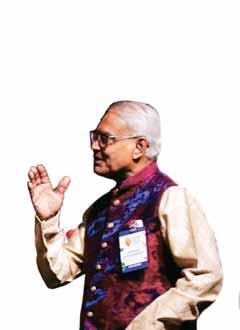

were, and he said he hadn’t seen anything like that in his life. “That was 2006; the next disaster came in 2010, when a quarter of Leh city was wiped away and 1,000 people were lost, followed by two more big ones in 2013 and 2017, with several small ones in between.”
This grave situation in the high Himalayas is not only devastating lives of the local people, “it’s also taking away the water that your children should have had in the next generation, causing floods now but impending drought for the next generation. Because these are the glaciers that have fed North Indian, Gangetic and the Indus plains in Pakistan. The water’s coming down in a fury that is devastating; but what comes tomorrow will be even more devastating.”
Creating artificial glaciers
Urging Rotarians to “understand the gravity of the climate crisis and the urgent need to change and adapt innovatively to the present crisis,” Wangchuk said to tackle the impending shortage of water from melting glaciers, “we’ve started working on artificial glaciers thinking that even though the natural ones are melting away, till there is some flow, let’s recreate glaciers ourselves.”
This involved refreezing the stream water, “which still flows in winter. You’d think it freezes, but under the ice some water still flows. We freeze the glaciers using geometry shapes, which the children learn at school. Normal ice happens horizontally… flat, and that is exposed to the sun and melts in early spring. But when you use a little geometry, and create spherical and conical shapes, you get low surface area and high volume. And farmers need just that.”
He added that they had built glaciers that had a height of 6 to 12 storeyed buildings, with the big ones having the capacity to hold 10 million litres of water. “They form in winter and then, because of the shape, don’t

melt in March or April, unlike ice on the ground. They stay till June when farmers really need the water and there is no sign of ice anywhere.” As this artificially created glacier melts slowly, water becomes available as the system works like a drip irrigation. So, you have trees blooming in deserts that have never seen trees, he said.
But, Wangchuk admitted, these were very small measures and he wasn’t really proud of them. “These little artificial glaciers or solar power will not change the destiny of the Himalayas and its glaciers. Innovation needs to happen at much larger scale for things to change on this planet.”
Unfortunately, we are not adapting what is required fast enough. “We think that engineers and technologists will find solutions. The problem is not technology, it is our outlook towards the world, our sensitivity for the future generations, our empathy for fellow beings, not just humans. All the other beings on this planet… plants, animals, birds, insects… have equal rights on the planet. We humans actually
deserve to be punished for what we are doing.”
Putting faith in the human being’s traditional quest for innovation, Wangchuk said, “I think human beings’ biggest innovation is not one of rockets or electric vehicles. To me, their biggest innovation is the concept of God. That needs to be re-adapted to current times.”
Because it dated back to the times when there was no law or system, might was considered right, “and if we had differences, I could break your skull open if I was stronger. And nobody would question me.”
So in a world filled with violence, where might was right, man came up with the concept of something that was way stronger — God and religion — and voila, it worked! But now to deal with today’s problems, a new version, God 2.0 is needed, “with the concept being adapted to current times to enable us to address today’s problems,” he concluded.
Pictures by Rasheeda Bhagat
RID 3170 DRR Nikhil Chindak has been instrumental in bagging a CSR grant of `25 lakh from Ayu Foundation, the CSR wing of Vijaykant Food and Dairy in Belgaum. “The funds will be used to provide cervical cancer vaccines to 1,000 young girls in schools,” says Chindak, a member of RAC Belgaum South.
“We had decided on the project last year before beginning my term as DRR and the costs worked out to `20–25 lakh for 1,000 vaccines,” he adds. Serum Institute will provide the vaccines for the project.
Team Rotary News

Chindak says that the CSR partner was introduced to him by his mother who is the president of the Karnataka Rollball Association. Chindak is a champion skater having won national awards, including the Asian Championship Trophy in Goa recently.
His next plan includes enlisting CSR support to set up a blood bank in the city. “It would cost at least `1 crore. We are in the process of identifying a partner,” he says.
To promote literacy in rural regions of the state, the DRR has encouraged the district Rotaract clubs to


distribute school bags to students hailing from less privileged families under the project, ‘One Club, One School’. Each club will be sponsoring bags for a school. He has personally sponsored 10,000 bags which were distributed by the zonal representatives to various schools. The district has 84 active clubs. “The clubs are undertaking vocational training, sports competitions and extracurricular activities in various schools to help build self-confidence in children,” he says.



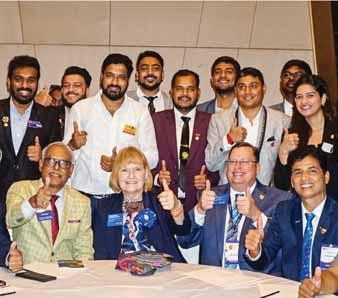

Rotaract district leaders with (from L) PDRR Arun Teja, PDG BM Sivarraj, PRID Mahesh Kotbagi, RI Director Anirudha Roychowdhury, RI President Stephanie Urchick, PDG Tom Gump, RIDE K P Nagesh, PDG VR Muthu and RSAMDIO President Sahil Gandhi at the Rotaract session in the Rotary Zone Institute in Kochi.


Wenjoy the fact that we are creating magic. While we’re changing people’s lives, we’re also enriching our own,” said RI President Stephanie Urchick, addressing a gathering of 46 DRREs and DRRNs at the Kochi Rotary Institute. She stressed the importance of fun and engagement in sustaining interest and participation in Rotary’s initiatives. She highlighted the need for collaboration and smooth transition from Rotaract to Rotary. “Misconceptions


Jaishree
e h should have f fun and d j th f t th t exiist on both Rot o arians i R t t i i
exist on both sides, Rotarians often view Rotaractors as inexperienced; Rotaractors see Rotarians as outdated and disconnected. Mutual learning, especially reverse mentoring, is essential for growth,” she noted, emphasising that Rotary is not just for older individuals, but for anyone passionate about service.
Referring to the landmark decision to elevate Rotaract at the 2019 CoL, she said more structured measures are needed to make this transition effective. She urged district leaders to
actively engage Rotaractors and sustain their initial enthusiasm. “There is something for everyone. The challenge lies in identifying the spark and nurturing it. It’s easy to get somebody to come into our world. But retention requires effort,” she said.
The RI President praised Rotaract for fostering inclusivity and diversity. “Rotaract clubs are already achieving milestones in gender diversity, with 50 per cent female representation globally, compared to Rotary’s sub-30 per cent. Strengthening diversity leads to

stronger organisation.” She suggested forming satellite clubs for Rotaractors that can “help bridge the gap while preserving their vibrant culture.”
Institute convenor RI Director Anirudha Roychowdhury expressed concern over the dwindling Rotaract strength. “India has the largest contingent of Rotaractors, yet we lost 17,000 Rotaractors this year. We bank on you for fresh ideas; you are the future of Rotary,” he said, and called to Rotary and Rotaract clubs to work together and collaborate for effective service
projects. “Your energy is vital, but you must embrace the legacy of Rotary to take our prestigious organisation into the future.”
RI Director Raju Subramanian noted that Rotaract membership has drastically dropped since the introduction of membership dues. “Weigh the benefits of being a part of Rotary, the personal development it offers, the amount of good you can give to your community and the networking opportunities. Rotary extends its hands to help you become better individuals,” he said, and observed that no Rotaract district has come up with a global grant project, a transformational aspect of the ‘Elevate Rotaract’ resolution.
PRID Mahesh Kotbagi called upon them to “identify the less privileged around you and give them the opportunity to grow. Whatever you do, maintain your integrity.”
RIDE M Muruganandam recalled his days as a Rotaractor. “Times have changed, but one thing remains clear: the importance of a structured approach, or cadence, in our work,” he said, and highlighted Rotary’s three critical aspects — its strength, its unwavering commitment to service and embracing responsibility.
“Rotary is not just a name — it’s a movement, a platform that unites 1.4 million people through shared
values and a commitment to service. Together, we protect not just the health and wealth of India but of the world. Let us continue to grow, inspire and lead with purpose.”
Highlighting India’s achievement, he said, “Rotary India is thriving. India stands tall, not just in numbers but in the quality of service we deliver. Out of over 220 countries, India ranks second in growth and service.” He urged the youngsters to “embrace responsibility. Rotary offers everyone this opportunity — to step up, take charge and create meaningful change.”
Muruganandam also shared the 1:2:3 formula that he, along with RIDE K P Nagesh, will focus on to strengthen membership. “For every new Rotarian inducted, two Rotaractors and three Interactors must be inducted. Similarly, for every new Rotary club, two Rotaract and three Interact clubs must be chartered,” he said. He encouraged Rotaract clubs to organise RYLAs for Interact clubs in government schools.
Rotaract clubs have achieved milestones in gender diversity, with 50 per cent female representation globally, compared to Rotary’s sub-30 per cent.
Stephanie Urchick RI President
RIDE Nagesh stressed the need for a mindset shift among both Rotarians and Rotaractors to foster better collaboration. “Rotarians need to stop viewing Rotaractors as “kids” and recognise their potential, while Rotaractors should appreciate the experience and wisdom Rotarians bring. Rotaractors excel in adopting new technologies and innovative approaches. Rotarians should acknowledge this strength and integrate these ideas into their traditional methods for mutual benefit. The future of Rotary depends on this understanding,” he said.
He suggested Rotaract clubs should sponsor Interact clubs and inspire Interactors to join Rotaract. For better coordination between the Rotaract and Rotary leaders of districts, Nagesh suggested a joint session for DRREs and DGEs at the upcoming Disha training seminar.
V Muthukumaran
Aweek-long Project Hasi (smile) by 23 Rotaract clubs in RID 3240 at the start of new Rotary year from July 1 created an air of camaraderie among the youth brigade of Rotary in the northeastern region of India. “Around 170 gift boxes were distributed to poor children living in slum colonies and underprivileged areas from north West Bengal to regions across the northeastern states of India which brought smile
on their faces,” says Dipujjal Das, project secretary, Rotaract District 3240.
Each gift box contained stationery items, toys, a pair of new clothes and chocolates. Around 115 Rotaractors were involved in Project Hasi, a brainchild of DRR Aloka Dey, which was conceived to “stimulate happiness in children despite their daily hardships as they all hailed from underprivileged families.”
Rotaractors from across the district pooled in money to distributed relief
materials to flood-affected families in Tripura in August and September. “Massive floods displaced thousands of people in Tripura. With the support of RC Agartala, we gave warm clothes, blankets, food packets and daily essentials to 800 families,” says Das.
As a professional service, job vacancies at the public sector companies, those being announced by the UPSC, State PSC, and banking sector are being informed on the district Rotaract WhatsApp group. “We also


intimate our members about career prospects in the private sector by forwarding the job vacancies in private enterprises that appeared on leading dailies and other media outlets,” says DRR Aloka Dey.
Stating that her district is spread over a vast and complex area starting from West Bengal and then covering all the eight northeastern states with great diversity and cultural-mix, she says, “we have 700-plus members

across 42 Rotaract clubs. Our target is to breach the 1,000-mark by adding 300 new Rotaractors in the next six months.”
Regular induction (or orientation) sessions are being held for new members, and “till now 25 such engagements were held to familiarise new Rotaractors about Rotary’s legacy, and its youth movement, Rotaract,” says Aloka, also a member of Rotary Club of Naharkatia. “Our Rotaractors have contributed `54,490 from their pockets to the Polio Fund of TRF so far this year.”
Having joined Rotaract four years ago, Dipujjal Das (27) from RAC Dharmanagar has completed B Tech (Civil) at NIT, Silchar (Assam), and he is now preparing for the Engineering Services Exam, a part of State Public Service Exam, Tripura. “I am looking forward to become an active Rotarian in the near future,” he adds.







Rotaract UN Days is an inspiring event that brings together Rotary International Representative Network, Rotary, Rotaract, the United Nations and other leading international organisations based in Geneva. This unique opportunity, open to public, is designed to inspire and empower the next generation of young leaders from around the world, who will gain valuable insights into how they can contribute to building a more peaceful world through human rights, health, economic development, peace and science. The event is organised by Rotary International that has the ECOSOC (Economic and Social Council) consultative status at the United Nations.
The programme was organised at the United Nations office in Geneva, Switzerland, from Oct 30 to Nov 2, 2024. It brought together global diplomats and members of Rotary and Rotaract to discuss the sustainable development goals and global issues.
The event was a platform for the clubs of various countries to represent their projects and gain international support for their work. There were various talks on the aspects of multilateral cooperation in terms of its importance and ways to promote it. Topics such as multilateralism and its impact, refugees’ and migrants’ challenges, and intellectual property issues were informative and interesting.
On the inaugural day, RI representative Sanela Music detailed about the significance of the Rotaract UN Days programme. UN director general Tatiana Valovaya spoke about the role of Rotary and other NGOs in fostering international collaborations. Swiss ambassador Dr Walter B Gyger spoke about the importance of multilateralism and the global tragedies that could occur if nations do not cooperate. UNICEF goodwill ambassador Gaby Moreno and Rotaractors from various countries engaged in a panel discussion regarding the
challenges and concerns of immigrants and refugees.
RI President Stephanie Urchick spoke about Rotaract and its activities worldwide, and its role in bringing together individuals for the betterment of the community. A Q&A session anchored by Rotary Geneva International representative Mathew Kilgarriff had Stephanie highlight the goals of Rotaract. She urged ‘double-pinned members’ (dual members) to act as intermediaries between Rotary and Rotaract, implement a mentorship programme where each Rotaractor has a Rotarian mentor, and more Rotaract clubs to apply for global grants for their service projects. A panel discussion had Rotaractors from various countries talk about the role of youth in bringing about social change and the various developmental projects done by their clubs.
The second day’s events were held at the World Intellectual Property Organisation (WIPO) office. WIPO, established in 1967, is the global forum for IP services, policy information and cooperation. Its contributions extend to shaping international IP laws, fostering innovation and addressing global challenges.
Daren Tang, director general of the WIPO, spoke on multilateralism, and elaborated on the work of the organisation and the importance of intellectual property. WHO director general Bruce Aylward recalled his association with Rotary and its End Polio efforts, and the challenges faced along the way. He also detailed about WHO’s work on healthcare in conflict and disaster zones.
Other topics such as intersection of IP and healthcare with regards to AI-generated and assisted healthcare products were informative. Bernard Kuiten, representative of the World Trade Organisation, spoke about the role of the WTO in geopolitics and conflict.
Members of the Global Shapers Community spoke about their mission
and the projects they have done. It is an organisation that helps connect passionate changemakers from around the world, share ideas, learn from different perspectives and collaborate on projects with global reach.
Dr Rolf Heuer, head of particle physics at CERN (European Organisation for Nuclear Research) spoke about the challenges to peace and how through peaceful research CERN helps unite countries and form collaborations which aid in the development of revolutionary technologies.
We were given a tour of the CERN Science Gateway where we learnt about quantum physics, particle accelerator and saw exhibits from across our universe.
The event was a medium for constructive and informative discourse between the Rotaract club delegates from various countries as well as UN organisations on the importance of multilateral cooperation between nations. In these turbulent times of climate change and global crisis the future of the human species relies on our ability to work together to create a better tomorrow. There were opportunities to interact with other Rotaractors to gain better understanding of their nations and forge collaborative bonds between the clubs.
We also learnt about the working of the UN and its organisations such as the WHO, WTO and WIPO, and had the opportunity to interact with the people heading these organisations. The visit to CERN allowed us to see how research into the peaceful applications of physics can help countries work together setting aside their differences all the while leading to various advancements in technology that benefits humanity.

The writer is a member of RAC SRM KTR, RID 3234. He was the sole Rotaractor to represent India in the 2024 Rotaract UN Days programme

V Muthukumaran
All roads will lead to Insportz Arena, Whitefield, in Bengaluru for two days (Jan 25–26) as Rotaractors of RID 3192 have pulled all the stops to make Rotaract Sports Mania a thumping success. “All our 1,500-plus members across 60 Rotaract clubs can take part in track and field events, indoor games, cricket and football tournaments at the sports meet that will showcase the athleticism and spirit of our Rotaractors,” said DRR Surya Kiran.
Hosted by RAC Vidyaranyapura, he said, “we are planning to invite national-level sportsmen as guests
of honours with our DG Mahadev Prasad inaugurating the two-day spectacle.” The DRR has already inducted 455 new Rotaractors from July 1, “and I am confident of adding 1,000 more by June 30, the end of Rotary year.”
Sharing the optimism of his chief, Rotaract district secretary Rakshith Shetty detailed some of the notable projects that have lifted their pubic image in and around Bengaluru. Project Evolve 2.0 helped 80 college students to redraft their resumes “so that it reflected their skills and aspirations for a lucrative career,” said
Above: Rotaractors with children at the Sri Aravinda Primary School, Doddaballapur, at the scholarship distribution event.
Below: RAC Surana College
Southend members visit Uttarahalli, a suburb near Bengaluru, to distribute clothes to less privileged families.
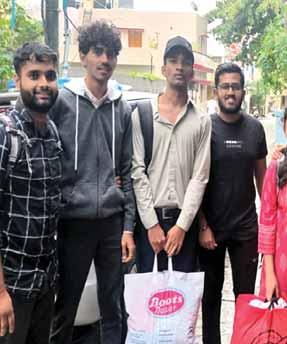
Shetty. An HR executive Nisha tutored the students in the one-day workshop for ‘resume drafting’ hosted by RAC Presidency University.
Around 65 students who had passed Class 10, 12 board exams were given scholarships worth `6.5 lakh by RAC Bangalore West under Project Vidhyadhan. The amount was raised through fundraiser events, and “the decade-old project had benefitted over 500 students till now.” The Rotaractors of RAC Falcon Youth hoisted a 77-feet tricolour at the Lalbagh Botanical Garden as part of 78th Independence Day celebration in which 100 people including 20 Rotaractors took part at this Project Ek Bandhan 18.0 Cross-country motorcyclist Rohit was the chief guest.
A team from RAC Surana College Southend visited Uttarahalli, a suburb near South Bengaluru, and distributed sparsely used clothes to 30 underprivileged families (Project Vastra Jyoti). “We collected a range of dress material from the public, sorted them, and then neatly packed them in carton boxes, which were then delivered to needy families living in the suburbs,” said Shetty.
Around 30 students of Sri Aravinda Primary School, Doddaballapur, were



given scholarships by RAC Bangalore Basaveshwaranagar in a joint project with Suchetana Charitable Trust. Over the last four years, Project Vidya Sankalpa is also taking efforts to increase enrolment of Kannada medium students in this school. Sri Aravinda Educational Institution treasurer Venkatappa, school principal Sarvamangala, senior teachers and Rotaractors were present. The project distributes the educational needs of government school students like books and stationery, apart from scholarships.
Fifteen Rotaractors from RAC
Vidyaranyapura taught 4,500 people across age groups how to make ecofriendly clay Ganeshas at workshops held in 11 different places. Working as an IT data analyst, Shetty recalled his five-year stint in Rotaract and said, “I have learnt a few critical things about leadership, HR management, and more importantly, how to cope with time pressure with good skills in stress management.” He wanted to be a Rotarian in the next five years “so that I can do some impactful service to communities in Bengaluru,” he adds.
On World Kindness Day (Nov 16) RAC Navi Mumbai Sunrise, RID 3142, conducted a workshop to empower the transgender community through Beat with Beads project. Around 20 transgenders were trained to make bracelets and other accessories using beads.
“We coordinated with the Aarju Foundation that provides shelter to members of the transgender community ostracised by society,” said Akankshi Bhattacharjee, the project coordinator. The foundation supports its residents by facilitating education and skill development courses funded by the government. This session not only fostered creativity but also opened avenues for supplementary income.
“We plan to expand this project to reach more people with new ideas,” she added.
The club also aims to organise mental health programmes through art and dance therapy for the community. The Beat with Beads initiative was funded by contributions from club members and supported by the club’s gifting partners Mapleitis.
Under project Pearly Whites, the club, in collaboration with its parent club, RC Navi Mumbai Sunrise, and the Bharati Vidyapeeth Dental College and Hospital, completed three phases of dental camp for schoolchildren. Over 800 children across three schools received free dental check-up and a session on oral hygiene. “We are now planning to extend this project to students in Rotary Happy Schools within our region,” said Akankshi.
On Children’s Day, the club brought smiles to eight street children with their heartwarming “Meals of Love” project. Hosted at a McDonald’s outlet in Kharghar, the event, made possible with discounts generously offered by branch manager Prahlad, gave the children an unforgettable experience. Sponsored by eight club volunteers, the children enjoyed a delicious meal, played games, danced to lively music, and explored the mall for the first time, riding escalators and toy cars.



Jaishree



“It was their first time in a mall, and their joy was priceless,” Akankshi shared. At the end of the day, the children were safely reunited with their parents, who worked outside the mall.
Ahead of Diwali, the Rotaractors conducted a creative diya-painting activity at Inampuri School, Kharghar, and CLC School, Hanuman Nagar, Turbhe. The children enthusiastically painted the lamps in vibrant colours, showcasing their artistic flair. “It was therapeutic to see the children unleash their creativity and enjoy the process,” said Akankshi. Each child was encouraged to take home the painted diyas, adding a personal touch to their Diwali celebrations.

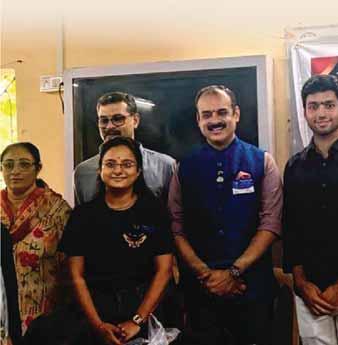
V Muthukumaran


RAC Dahisar Coast president Mitti Doshi (2nd from Left) with Rtn Pankaj Phatarphod to her immediate left, Rotaractors and other Rotarians at the Subhedar Ramji Ambedkar Vidyalaya, a part of Tambe Education Society School, at Project Happy School
Following a request from the school authority, a team of eight Rotaractors from RAC Dahisar Coast, RID 3141, camped at the Tambe Education Society School, a government-aided institute, and distributed black shoes to 100 students as part of their Happy School project which is providing school essentials to students over the last seven years. “We also donated
six ceiling fans for their classrooms, and gave sanitary napkins to 70 girls studying there,” said Mitti Doshi, club president.
Every year this community-based club with 37 Rotaractors at present used to either pay tuition fees of underprivileged students or donate stationery items at government schools under Project Happy School. Thanks to their well-diversified membership


playground, Dahisar, a hotspot for youth and sports buffs from underprivileged colonies.
consisting of working professionals including lawyers, doctors, engineers and chartered accountants, apart from college students, “financing our projects is never a challenge. We collected money from our families, friends, Rotarians and alumni of our club for the Happy School project which cost ` 27,000 this year,” explained Mitti. Snack boxes were distributed to 80 children at the Gopinath Munde

A team of 7–8 Rotaractors visited the four-day cultural fest at the Aditya group of colleges at Borivali to engage students and create awareness on Rotary, Rotaract and their global activities. “Through pamphlets and three banners put up there, we drew visitors and got positive enquiries about the work we do. The positive vibes on Rotary we created at the college fest will help us to attract new Rotaractors in the near future,” she said.
The Rotaractors meet twice a month to deliberate on their upcoming service projects, take stock of the work being done and plan ahead for the future. Expressing her gratitude to their parent club, RC Mumbai Dahisar, for their “unstinted support and encouragement in all our endeavours,” Mitti pointed out that their parent club president Avinash Naimpally “gives us helpful suggestions and ideas for planning our project schedule.”
Moreover, the Rotarians readily come forward to sponsor Rotaract projects, thus strengthening their bonding with the youth brigade of Rotary.
Recently, the Rotaractors did all the spadework for the felicitation event in which Class 10, 12 board toppers were honoured by their Rotary club. “We went to schools, spoke to the parents and invited them, along with their children, for the awards event in which we anchored the sessions,” she said. While Rotaractors are always present in Rotary’s community initiatives, “we also give our ideas, inputs during the planning sessions for mega events in and around Dahisar.”
Now engaged in supporting her family enterprise as a practising CA, Mitti Doshi recalled her three-year Rotaract journey enabled her to gain many new friends through networking and “hone my public speaking skills.” She has not thought of becoming a Rotarian till now, but “maybe after a couple of years, I will give a serious attention to the idea of being a fullfledged member of a Rotary club,” she adds.
Jaishree

In a heartwarming endeavour, the Rotaractors of RAC Stella Maris College for Women, RID 3234, paid tribute to infants gone too soon and laid to rest at the Kilpauk Cemetery in Chennai. The project titled Light of Hope was executed on Pregnancy and Infant Loss Remembrance Day (Oct 15), an annual observance dedicated to honouring the memory of babies lost to miscarriage, stillbirth or neonatal death. This day offers parents, families and loved ones a chance to acknowledge their grief and reflect on the lives of the babies they have lost. The day is also meant to raise awareness about the prevalence of pregnancy loss and infant death, and the emotional and mental challenges faced by those impacted by pregnancy and infant loss, fostering support and understanding within communities.
Wikipedia states that “the day was established in the US in 2002, thanks to the efforts of Robyn Bear, Lisa Brown and Tammy Novak, each of whom had

experienced the devastating loss of a baby. They aimed to create a day of remembrance and raise awareness of the issue. Over time, this observance received recognition through bipartisan Congressional resolutions and has now grown into an international event.”
Since it was first observed, Pregnancy and Infant Loss Remembrance Day has been a source of comfort and solidarity, providing a space for people to share their grief and honour the lives of their lost babies.
On this day, the Rotaractors of Stella Maris College lovingly cleaned the infant graveyard at the cemetery, transforming it into a serene and sacred space for remembrance. Each grave was tenderly adorned with a lit candle, symbolising the eternal love and light these little souls brought into the world. A poignant prayer service was held at the Kilpauk Votive Shrine Church and at the cemetery, words of comfort and hope were shared to lift those carrying the weight of child loss.


Talking about the project, the project coordinator KJ Lincy Catherine said, “Child loss is a grief that words can scarcely describe, yet society often adds to this pain by placing blame on parents instead of offering compassion. Through this initiative, we sought to break the silence, stigma, and the taboos surrounding child loss. As we read the heartfelt messages engraved on the tiny gravestones, we felt the depth of love and the immeasurable sorrow that parents carry. What touched us deeply was seeing
parents still visiting the graves of their children, even after many years had passed.”
It was a powerful reminder that the love for a child knows no bounds of time or space. It is eternal, as is the pain of their absence. “Even though we did not know these children or their families, we stood with them in their pain. Through our actions, we hoped to remind grieving parents that they are not alone, that their loss is seen, their grief is valid, and their children are remembered.”
V Muthukumaran
Creating awareness on menstrual health and hygiene is one of the top priorities for Rotaractors at RAC Bombay Chembur West, RID 3141, as Project Dignity Drive is distributing sanitary pads to rural
women in Palghar district of Maharashtra.
They have given two sanitary packs each (of 10 pads each) to 250 women at Lalthane village, Palghar, and “one pack each to 46 girls staying at the Lalthane Ashram Hostel so far

this year,” said Payal Raju Pacharkar, club president.
The club has bought 5,000 sanitary napkin packs from the Pradhan Mantri Jan Aushadi Kendra under a concessional rate for their project.
A team of 12 Rotaractors camped at Lalthane, distributed the sanitary pads and engaged the rural women urging them to adopt safe, hygiene ways to ensure menstrual health.
“We also gave sparsely used clothes, that were collected from the public,
RAC Bombay Chembur West president Payal Raju Pacharkar (standing, 3rd from Left) and Rotaractors at Lalthane village at Project Dignity Drive.
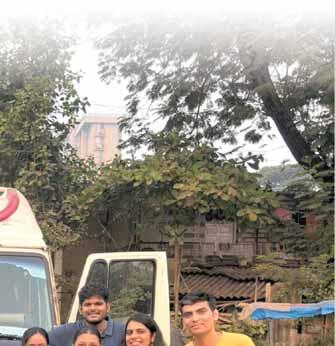


sorted and then neatly packed in carton boxes, to beneficiary families,” said Payal.
She is planning to distribute stationery items to around 50 students at the Rishi Valmiki Eco High School at Manori island in Malad district near north Mumbai. “Notebooks, pencils, erasers, maps, scales, compasses, white boards and a cupboard for shelving books will be given to teachers before the start of the academic year in June. The stationery items will be distributed by teachers to their respective class students.”
Expressing heartfelt thanks to their parent Rotary, RC Bombay Chembur West president Deepa Mani and its Rotaract Committee chair Hemant Pardasami who invite them for their weekly club meetings, Payal said, “we regularly speak about our Rotaract projects, upcoming events, at the Rotary meet which helps us to raise funds, thanks to Rotarians, for our service activities and community initiatives.”
Though this community-based club was chartered in 1999, “it could sustain itself only for a few years… after a gap, the club was revived in 2015–16, and now we are going steady,” she said. With 31 members from diverse professions including doctors, financial analysts, researchers, businessmen and college students, “we are supported by our parent Rotary who

Above: Rotaractors give sparsely-used clothes and a sanitary napkins pack to a family in Lalthane village.
Below: Sanitary napkins being distributed to girls at the Ashram school-cum-hostel.

provides us with resources, mentorship for Rotaract events.” They have an inspiring motto, ‘Learn, Change and Grow’.
A financial analyst at a private firm in
Mumbai, Payal said, “it was a fulfilling four-year Rotaract journey for me as I developed not only my personality, but also the Rotary exposure brought a radical change in my
perspectives on life, men and matters.” She has not given a thought about becoming a Rotarian till now, however, “I will continue to do community service,” she smiles.


Kiran Zehra

Tanisha Raghuwanshi, the secretary of the Rotaract Club of Meghdoot Symbiosis, RID 3040, stood nervously in front of a group of girls at the Anand Service Society, Indore, clumsily attempting to communicate in sign language. Guided by Monica Purohit, the co-founder of the society, Tanisha slowly formed the gestures for her name. “One girl had a broad smile on her face and excitedly


signed back revealing that her name was also Tanisha. I smiled with relief and the ice broke. My earnest attempt at communicating with them was accepted,” she smiles.
The club organised a sanitary pad donation drive at the Anand Service Society, an institution dedicated to empowering deaf and speech-impaired individuals. Established in 2000 by Gyanendra and Monica Purohit in


memory of Gyanendra’s late brother who was also deaf and speech-impaired.
“Over the years, it has helped more than 25,000 individuals gain skills and enabled over 5,000 to lead independent lives. The society operates residential centres in Indore and remote areas like Dhar and Alirajpur, providing refuge and resources for girls rescued from child labour, domestic violence, and a few girls are rape victims,” she says, and

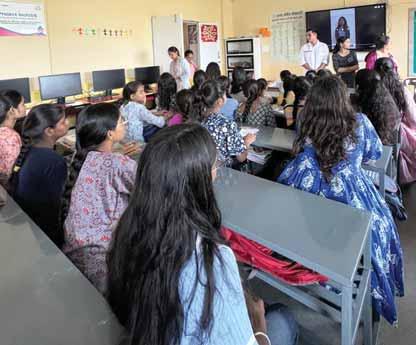
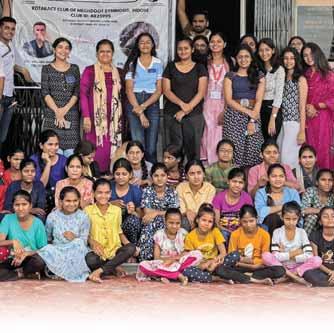

Not only was this an opportunity to provide material support but we also gained insight into the unique challenges faced by differently-abled individuals.
Tanisha Raghuwanshi Club Secretary
adds that “its work extends to running a helpline for the deaf and speech-impaired in collaboration with the Tukoganj police station in Indore.”
The club distributed sanitary pads, sugar, wheat, clothes, and oil worth `5,000 to inmates at the Anand Society. The initiative also included a menstrual awareness session where Rotaractors discussed the importance of seeking medical advice for irregular cycles,
severe pain, or other health issues. A list of medical helpline numbers was shared to ensure the girls had access to continued support.
“Communication was our main challenge,” says Tanisha but “Monica madam introduced us to basic sign language, allowing us to communicate directly with the girls. Learning sign language not only bridged communication gaps but also highlighted the broader principles of diversity, equity and inclusion for us. Trying to communicate in the girls’ primary language, we understood the importance of creating spaces where everyone feels seen and heard.”
“Not only was this an opportunity to provide material support but we also gained insight into the unique challenges faced by differently-abled individuals,” she says. “This was more than a donation drive. It was an opportunity to create meaningful connections and promote inclusivity.”
Last year, the club collaborated with the Rotaract Club of Indore Young Leaders for a similar project.
V Muthukumaran
Every year a few days before Diwali, around 30 Rotaractors from RAC Madurai North, RID 3000, used to visit at least five special homes including orphanages, children’s homes, special centres for mentally-ill people and old age homes to distribute new clothes, sweets, toiletries,
pillows, bedsheets and other essentials for the inmates under Project Magizhvithu Magizh (Be happy by making others happy).
This seven-year-old Diwali initiative is their signature project which has so far reached out to 35 special homes in and around Madurai. “We look forward to this interaction
with destitute, special children and abandoned elders as they bond with us really well,” said M Muthukumaran, club president.
First, they visited Anbagam Illam, a home for differently-abled, and Pushpagam, a care centre for children of HIV parents, in the morning. After giving them dress


material, sweets, “we burst fire crackers with the children.” Then the Rotaract team went to Arasu Nagarpura Veedatror Illam, an orphanage run by the city corporation, and interacted with the inmates, and followed up with a pit stop at Shanmanas, a mental asylum. “We gave the inmates at both the special homes sarees, veshtis and nighties. While toiletries and inner garments were distributed to special children,” said the club president.
Pillows, bedsheets and other niche fabrics were donated to elders at the Adaikalam Muthiyor Illam, an old age home. “In the morning, the children staged a small
cultural event for us. We enjoyed their lively chat, and in the afternoon the elders at the old age home regaled us by singing old, classical movie songs. We also joined the chorus, enjoying the magical moments with the seniors who narrated their rollercoaster life journey,” said Muthukumaran.
This year alone, they had distributed goodies and daily essentials to at least 330 inmates of special homes, “while our project would have reached out to 1,500 beneficiaries in the last seven years.”
The project cost of `1.60 lakh was raised through crowdfunding on their social media handles including Facebook,
Instagram and group WhatsApp.
On Sundays, Rotaractors distribute at least 50 food packets consisting of variety rice, sambar and pickle, all neatly packed in carton boxes, to roadside people and homeless families in Madurai. “We have delivered food to 800 hungry people over the last 150 weeks that the Project Oru Velai Soru (one-time meal) has completed so far.”
The food is prepared by Rotaractors in their homes.
In February, the club would install two sanitary pad incinerators at the LPN Girls H S School benefitting 800 students, apart from donating a
table tennis board, at a total project cost of `25,000. Their parent club, RC Madurai North led by its president T Hariharan, help them in many ways as they provide both moral and material support to Rotaract projects. “Rtns Saravana Raj and Sathish Kumar, club secretary, are behind our multifold initiatives, events as pillars of support.”
Running his own HR consultancy firm, Muthukumaran joined Rotaract seven years ago. “I will become a Rotarian next year as a member of my parent Rotary club. My short-term goal is to become a Paul Harris Fellow and expand my service activity,” he smiles.
Project Digital Defence hosted by RAC PSNACET, RID 3000, featured guest speakers who dwelt on issues like cybercrime, safety in digital world, and empowering girls with knowledge that would protect them from cyber stalking and harassment. Around 150 girl students attended the one-day session in which Dindigul inspector Victoria Luruth Mary, sub-inspectors Eeswari and Loyed Shing shared their perspectives on issues related to cyber safety and the ways to ensure protection in the digital world. The event was held to mark International Day of Girl Child (Oct 11)

Police officials and cybersecurity experts at the workshop.

Rotaractors from RAC Delhi Midtown Maitreyi, RID 3011, conducted a mental health camp at an old age home in Lakshmi Nagar, Delhi, to mark World Senior Citizens Day. Apart from offering emotional support and holding mental well-being activities, it was ensured that the elderly felt valued and heard under Project Anubhuti. The event began with a meditative session, followed by a series of mental health stimulating activities like interactive talks, and the inmates recalling their life experiences. The day concluded with a group singing session that lifted the spirits of participants, and strengthening the bond between the elderly inmates and Rotaractors.
With the aim to enhance the biodiversity at Tavali Hills, members of RAC MSG Coper Nasik, Grapecity, RID 3030, joined with other volunteers for a tree plantation drive in this mountainous region. The Rotaractors also created awareness among the locals for a greener environment to ensure a sustainable future. The 78th Independence Day was celebrated with military officers, ex-army personnel, police officers and specials guests at the Tavali Hills. It was an occasion to revive the spirit of patriotism by recalling the sacrifices of the freedom fighters.


Blankets and warm clothes were donated to victims of Kishtwar fire victims in Jammu, thanks to generous help from Traders Federation Ware House former president and social activist Rattan Lal Gupta. In a handover event, RAC Jammu City, RID 3070, president Kavyam Mahajan received the donations from Gupta who was appreciated by Deepak Gupta, the current president of the federation. The club is also installing digital classrooms and libraries in government schools across Jammu, apart from working for the underprivileged children.
Jaishree

Rotaract Clubs of Dayal Singh College and OP Jindal Global University, RID 3012, hosted Street Beats , a public awareness event as part of the district project — Aaina Street Beats centred around vital topics such as gender health, sex education in schools and the importance of consent. By engaging with the public and encouraging open conversations, the event collected diverse viewpoints which were also recorded and uploaded on social



media platforms. “The idea was to extend its reach and foster widespread dialogue to create a more informed and inclusive society,” said the project contact Prisha Agarwal, chair of Project Aaina.
Distributing sanitary pads among women and adolescent girls in slum colonies and promoting menstrual hygiene awareness among them formed part of Project Aaina , she said. Under the project, the district Rotaractors with artistic skills painted public walls on various social issues to spread awareness among people.
Kuchi Giggles was another heartwarming initiative executed under Project Aaina , where RACs OP Jindal University and BPIT distributed 4,000 diapers to organisations supporting special children. Rotaract volunteers from the two clubs visited various institutions and educated children about personal hygiene, sanitation and proper waste disposal. Rotaractors celebrated Christmas with these children and conducted drawing competitions for them. Sweets and gifts were distributed.
Eighty differently-abled children had a fun-filled day at the Abhyas School in Model Town when Rotaractors engaged them in marble painting and a balloon race. The event titled Samavesh blended creativity, fun, and learning. A session on etiquette was conducted for the children to polish their social skills and boost confidence in everyday interactions. “We taught them to say ‘please, sorry and thank you’ and how to appreciate something or someone by clapping their hands,” said Aaditri Verma, the project contact for Samavesh.
V Muthukumaran
Ccommode was installed at the boys’ washroom, followed by cleaning of tiles at girls’ toilet block, “where we repaired the flushing system and installed new taps.” For staff toilet too, Rotaractors cleaned the tiles and fitted new taps. All the washroom walls got a fresh coat of pain after repair work.


logged drains, pathetic washrooms and a neglected handwash station were giving a foul odour with entire campus stinking at the Government Public School, Kotla, in Tapprian village of Rupnagar district of Punjab.
Step in RAC Rayat College of Law, RID 3080, and “Project Happy School has given a new makeover for this government primary school which has over 300 students till Class 6. Our team of 6–7 Rotaractors worked for a week to set aright the sanitation
facilities that were bizarre to say the least,” says Urvashi Sharma, club president.
First, a two-day cleanliness drive was held with five Rotaractors working to stem the leaking drains as the pipeline was blocked. “We hired three government labourers to remove the sewage blocks and regulate the gutter flow in the line. A sewer removal machine was pressed into service,” she explains. Next, three washrooms (for teachers, boys and girls) were renovated. A western
In the second phase of Happy School project, a library cupboard was donated to the school for them to keep books of all genres, “we also gave a set of books to their collections.” As the handwash station was in disuse, the blocked drain line was repaired and new taps were fitted to make the sanitation unit functional. The playpen (enclosed play area) was given a facelift as its walls were painted giving a radiant look.
While Rotaractors worked for seven days, “it took us a month to complete the restoration project as we had to
RAC Rayat College of Law president Urvashi Sharma (centre), along with RC Roop Nagar president Kulwant Singh (back row, 2nd from R) and Rotaractors, at the refurbished washrooms of Government Public School, Kotla.







Above: RC Roop Nagar president Kulwant Singh and Urvashi, along with children holding new shoes and uniforms, Rotarians and Rotaractors, at the Government Public School, Kotla.

take breaks in the schedule due to festival holidays at the school. Uniforms and shoes were distributed to 10 meritorious students,” says Urvashi.
The club used its own funds, plus a grant from Rotaract district 3080, for the Happy School project which cost ` 30,000. There were also some key sponsors including Kulwant Singh, president, RC Roop Nagar, Gagandeep Kaur, club’s youth service director, and Rotaract club advisor Harsimar

Singh Sitta. RC Chandigarh Mid Town president Nitin Kapur sponsored the uniforms and shoes for the students.
In the coming months, a pink toilet block for around 150 girls will be set up at the S D Senior Secondary School, Chamkaur Sahib, with Rotaract District 3080, providing the bathroom fittings including tiles, commodes, taps etc as it is a “district-wide project taken up by the Rotaract clubs.” Project Bachpan Bachao (Save the Girl Child), which got a certificate of appreciation from the SEARIC MDIO last year, is under planning stage for its upcoming edition. “It will be held at the Institute for the Blind, Chandigarh, with an official from the Human Rights Commission giving a special talk on preventing abuse of girl child, POCSO Act and the precautions to be taken to avoid such gender crimes. “We will be doing the project with the support of RAC Positive Abilities and 2–3 NGOs will also be roped in to have a wide variety of sessions like MHM seminar, fun activities and demonstrations by experts,” explains Urvashi.
Doing her fourth year Law at the Rayat College, Urvashi Sharma is looking forward to become a Rotarian in the near future. “I love public speaking, and being a lawyer, will advocate on issues that are dear to Rotary in future,” she smiles.


Udaan, a flagship district project of RID 3142, aims to uplift a less privileged settlement of around 60 families located on the outskirts of Kalamboli in Raigad district near Navi Mumbai.

“This community has existed for over 200 years but has seen very little development. In fact, they got access to water and electricity only a couple of years ago,” says Ramiya Pillai, the District Avenue chair in charge of this project.
Menstrual hygiene awareness session in progress at a settlement in Raigad district.

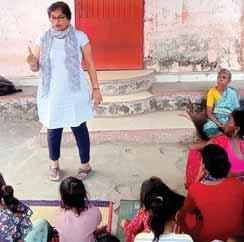

The families, primarily daily wage earners, live with minimal resources and opportunities.
All Rotaract clubs have pledged their support, contributing in various ways to transform this community



through a year-long initiative designed to improve their quality of life. “We will be focussing on key areas such as literacy, skill development and health awareness,” adds Ramiya.
The first phase of Udaan began with a menstrual hygiene management (MHM) drive targeting women and adolescent girls. Volunteers from RAC Saraswati College of Engineering conducted MHM awareness sessions in two phases, and distributed packs of biodegradable sanitary pads to them. “We were surprised to find that most women and girls had never used sanitary napkins and were hesitant to discuss menstrual health.”
Two Rotaract clubs — RACs Navi Mumbai Industrial Area and Navi Mumbai Nexus — distributed homecooked meals to the families. The Rotaractors spoke to the people about hygiene and sanitation.
Under the literacy initiative, volunteers from the district Rotaract clubs visit the settlement on weekends to teach basic literacy to children and functional literacy to adults. “We distributed alphabet and math books, notebooks and stationery to the children. The goal is to teach them to read, write their names, and perform simple maths — skills that can make a significant difference even if they

Above: A Biodegradable sanitary pad packets being given to girls and women.
Below: Rotaractors serve food for the residents.

do not continue formal education,” says Ramiya.
The village school, located a 10–15 minute walk away, offers classes up to Class 4. However, frequent absenteeism among children is a challenge, often requiring the teacher to visit their homes to encourage attendance. “Despite this, our weekend classes have seen a positive response,” she smiles.
A dental camp was organised to address oral health issues offering tooth extractions and fillings. For more complex cases, the patients were referred to a local dental clinic where treatments are provided at subsidised rates.
Next on the agenda is a medical camp. The district is also planning to construct community restrooms with help from Rotary clubs.
V Muthukumaran
In a mega one-day programme, a traffic awareness rally was staged by RAC Velalar College of Engineering and Technology, RID 3203, with the support of their parent Rotary club, RC Erode Thindal, at the Erode bus terminus in October. “With help of slogans, placards and banners we sensitised the public about the need to follow traffic rules to avoid road mishaps. Over 55 Rotaractors and 16 Rotarians marched around the bus terminus, a huge area, to drive home the message of road safety,” said Tharun Prabhu, club secretary.
During the flash mob, a group dance turned the spotlight on obeying the traffic signs and road rules to prevent fatal accidents. “We performed a small drama to enact a road accident to spread the message ‘Speed kills, go slow’. Our event was
much appreciated by the public, and we got positive feedback from the community,” he said. In a similar field project, over 400 pamphlets were distributed to the public to create awareness on dengue, with dos and don’ts listed in the leaflets to ward off this vector disease.
Commuters waiting at the Thindal bus stop near the college were engaged by Rotaractors, who also gave random talk to the public “about the need to take precautions against dengue.”
Club advisor Dr N Thangaraj, a guest faculty, led the dengue awareness project in which college principal M Jayaraman and RID 3203 district secretary Nallakumarasamy, a member of RC Erode Thindal, were also present to motivate the students.
A Rotaract team visited the Mercy Home, an orphanage, and provided a

non-veg biryani lunch to over 30-odd children under Project Ubasarippu (hospitality). “After lunch, we had a series of fun games with children who bonded with us nicely,” said Prabhu. Around 60 Rotaractors volunteered at a mega job fair conducted by the state’s Labour Welfare and Skill Development on the college campus. “We filled the application forms of candidates interviewed by private companies. Among the 1,500 candidates who had registered at the fair, around 500 were shortlisted by 75–80 companies who will further scrutinise the applicants,” he explained. College students from Erode, Namakkal, Salem, Trichy and other nearby districts attended the job fair.
Stating that members from their parent RC Erode Thindal “are the backbone of our club as they provide


resources and refer companies for sponsorship to conduct service projects and initaitives,” Prabhu singled out two Rotarians for their dedication in nurturing the Rotaract. Rtns Nallakumarasamy and Akchaya Gopal are pillars of support for this Rotaract club with their “helpful suggestions, ideas and valuable inputs for planning our club projects.” Also, these two Rotarians refer them to sponsors which take care of their project funding.
Thanks to his three-year stint in Rotaract, Tharun Prabhu, doing BE (CSE), said, “apart from widening my friends circle, I am able to organise and manage big-ticket events with my team of Rotaractors.” In near future, he would like to be a Rotarian, “but life situations may change that may alter my priorities. So, you never know what is in store for you, say three-four years down the line,” he signs off.
With inmates
Below: Dengue awareness rally by Rotaractors.







In a rare event, RAC Pune City, RID 3131, partnered with 18 other Rotaract clubs to conduct Project Shauryagatha – Untold stories by soldiers in which army men recalled their valorous efforts to protect the country in their line of duty. Rotaractors were moved by their bravery and grit in the face of enemy assault on treacherous terrains as the soldiers recounted their battlefield action. The soldiers explained in a calm manner the battlefield action, and the personal challenges they faced after they returned home, which made Rotaractors emotional at the Artificial Limb Centre, Pune, where the event was held.

Rotaractors being felicitated at Project

An online training session for non-Kannada speakers.
Project Kannada Learning Programme (KLP), a seven-year-old flagship initiative of RAC Koramangala, RID 3191, aims to fill the language gap of non-native speakers for them to integrate easily with the local culture of Karnataka. The virtual sessions offer a unique learning experience in which participants are guided through three sessions at that end of which they would be able to speak in Kannada and understand the Kannadiga culture. Expert instructors clarify doubts and offer personalised guidance.
Diwali was celebrated at the Little Drops Old Age Home by RAC Bangalore Oasis, RID 3192, with the support of 15 other Rotaract clubs in the city. The elderly inmates made decorative diyas jointly with Rotaractors, before they were lit, symbolising hope and unity. Following this, a music and dance party was held that evoked joy among the participants. New clothes and pillows were distributed to the elderly who interacted with Rotaractors, by sharing their youthful life and memories.

Senior Citizens holding pillows during Diwali celebration.

Young girls in schools are being empowered through menstrual health sessions by RAC GSS Jain College for Women, RID 3234, under Project Manidhi. The awareness sessions aim to empower school girls by dispelling social myths, taboos and stigmas attached to menstruation. The Rotaractors equip girls with knowledge and tools needed to manage their menstrual cycles with confidence and dignity. Also, the girls are taught to make informed decisions about their reproductive health and well-being.
V Muthukumaran
Even before Rotary introduced ‘environment and sustainable development’ as the seventh Area of Focus, Rotaract clubs of RID 3090 were doing Project Vriksha Bandhan (bonding with trees), a campaign to save trees in which a team of Rotaractors ties raakhi threads/ strings around trees in the urban and
rural areas of Punjab, Haryana and Rajasthan. “Our aim is not only to protect the fragile environment, but also sensitise both the urban citizens and rural people on the need to grow more trees for a sustainable future. Around 100 Rotaractors are involved in tying raakhi threads around tree trunks,” said DRR Sahil Jindal.
The district clubs have conducted 10 medical camps examining over 1,000 patients of varying age groups with the help of doctors from charity and government hospitals. “Over the last five years, our medical camps would have screened 5,000-plus people for chronic ailments, given free consultations and referred seriously ill to hospitals for treatment. We will hold 10 more medical camps in the next six months,” he said.
DRR Jindal has drawn up plans to distribute 5,000 sanitary pads at schools, colleges, urban areas, village community centres and panchayat halls. “We will take up pads distribution from the first week of January and reach our target by June 30.”
Mahadan camps
Ever since late PDRR Sahil Bhateja started the Mahadan drive, blood donation camps, at the South Asia level when he was president of SEARIC MDIO, the district clubs had conducted

over 100 camps collecting over 5,000 units of blood in the last 10 years. “This year, we have done five camps collecting over 500 units of blood, and have plans to hold five more in the next six months.”
DRR Jindal is keen to make the upcoming two-day fellowship event for district Rotaractors, slated for either April or June, a success. Apart from plenary sessions on Rotary-Rotaract issues, “the event will have DJ party and other light entertainments to regale the Rotaractors.” The fellowship gala will be held at Kasauli, a scenic hill resort in Himachal Pradesh. With 22 Rotaract clubs and 500-plus Rotaractors in the district, he is confident of “adding 100 new members and charter 10 new clubs in the next six months.”
During the installation of DRR and his team, DG Sandeep Chauhan urged Jindal to expand the number of Rotaract clubs, and also induct more

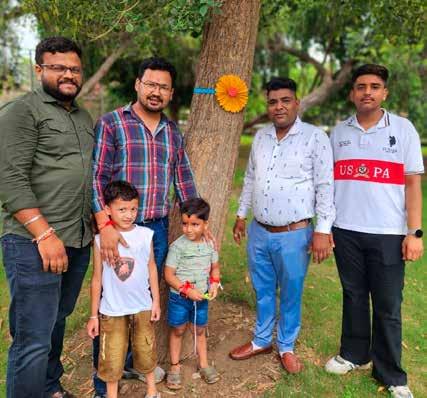
Rotaractors. “You have to be active, and also contribute to TRF which grants money for global Rotary projects,” said Chauhan addressing the Rotaractors and new office-bearers. “Rotaractors must work in unison with Rotary clubs to make RID 3090 a world class Rotary district in performance metrics.”
Having joined Rotaract 10 years ago, the DRR is keen to promote fellowship among the members “which will attract new Rotaractors as they will be interested in leveraging our network and explore new opportunities for service.” He will be joining RC Mansa Royal in July 2025 “which will help me to scale the ladder in Rotary trough fellowship and service,” said Jindal who runs a retail-cum-wholesale store in Mansa city, and a stock broking firm in Delhi.n

Jaishree

Above: Project Samavesh in-charge Sameera Madipodi giving a food packet to an elderly woman.
Below: School students strike a pose after a self-defence class.
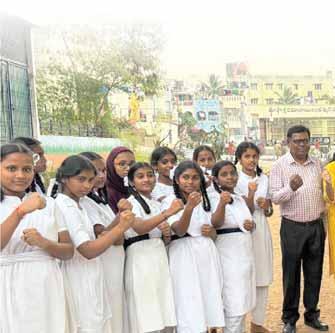
The Rotaract Club of Vizag Diamonds, RID 3020, along with RACs Vizag Champions and Visakha Satellite City, organised self-defence training sessions to empower young girls with confidence and to protect themselves during challenging situations. The programme called Veerangana focussed on school students of Class 8–9 and the sessions were conducted by expert trainers who taught them practical techniques and strategies to handle real-life threats effectively.
The project was launched at the Dr Ambedkar School in Visakhapatnam, Andhra Pradesh. “We will be reaching out to more girl students in the coming days,” said project coordinator Sri Vidhya.
Through Project Aakaliyug, volunteers from RAC Rajahmundry River City, along with RAC Vizianagaram Central Ekta, distributed freshly prepared meals to street dwellers and other less privileged people.




In a major collection drive under Project Daan Utsav, members of the Interact Club of Apeejay School Noida, RID 3011, mobilised essential items for school students at a special camp at the Vivek Vihar Society, Noida, in which the public contributed generously. “Our Interactors collected school items like school bags, tiffin boxes and water bottles for the underprivileged students,” said Sushma Paul Berlia, chancellor, Apeejay Stya Univeristy which runs a group of 26 educational institutions.
They have scheduled a follow-up camp and visit to local NGO Goonj for next month. Project Daan Utsav led by the Interactors inspires the students to not only broaden their knowledge, but also grow into a “caring and active members of the community,” said Sushma. This annual project is part of the series of community initiatives done under the aegis of Apeejay Stya and Svran Group in which Neha Berlia, daughter of Sushma, is the co-promoter and chair of the education vertical of RC Delhi Premier.

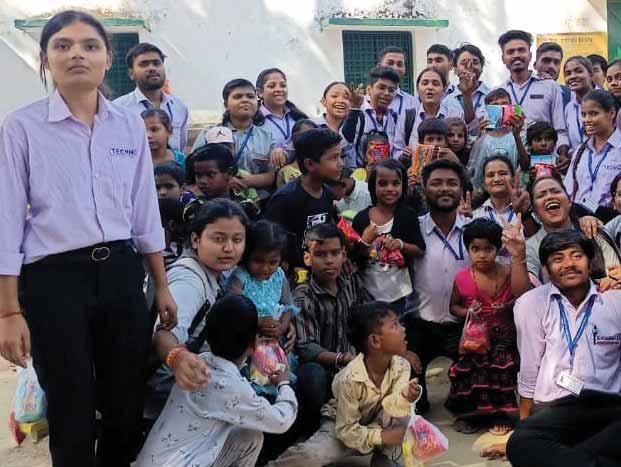

Makar Sankaranti (Jan 14) is celebrated as harvest festival across India when the Sun moves from the zodiac Sagittarius to Capricorn. On this day, Rotaract clubs of RI District 3120 observed Daan Utsav and were engaged in various service projects to extend cheer among the less privileged.

The Rotaract Club of Gorakhpur Yuva distributed khichdi, a nutritious, balanced meal made with rice, lentils and spices, among pavement dwellers and children residing in patashalas. “We prepared it in our homes, pooled it all together and gave it to few community kitchens and schools in the city for distribution. We all felt that this was a satisfying and a wholesome way to celebrate the festival — spreading joy among our community, as festivals are meant to be,” said club president Abhishek Kumar Singh. The club members collected sparsely-used, neat clothes from members, their friends and family, and distributed them among children in various localities.
RAC Mirzapur Gaurav led by its president Ritika Agrahari, distributed blankets to 50 individuals to protect them from the chilling cold. The Rotaractors observed Gandhi Jayanthi (Oct 2) by organising an awareness campaign at the city’s market places, against use of plastic bags. “We provided bundles of cloth bags to shops to be given to their customers to pack their fruits, flowers, vegetables and groceries. We highlighted about how plastics harm environment to shopkeepers and the public visiting shops,” she said.
Volunteers from the Rotaract Club of Pride Mau, led by its president Akash Jaiswal, distributed blankets to homeless individuals residing at railway stations, bus stands and roadside dwellers.
The Techno Rotaract Club of Barabanki celebrated Christmas with students of the Bachpan School. “We had organised fancy dress competition and a variety of games and fun activities for the children. It was a joyous and memorable experience for everyone,” said club president Durgesh Kumar Sahani. The children were delighted to receive

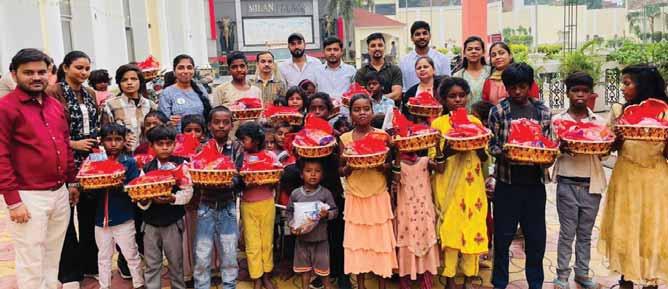
gifts from the club volunteers who played Santa in line with the Xmas spirit. They had also decorated the school with the traditional Christmas tree and festoons, adding to the excitement and joy.
On the eve of Diwali, members of RACs Prayagraj Sangam City, United, Prayagraj Platinum, Allahabad Midtown and CMP College organised a fun programme at the Ravindra Nath Gaud Anand Old Age Home in
Tagore Town, Prayagraj. “We had a wonderful time with the senior citizens present there. We played games, distributed sweets and fruits, lighted diyas and burst firecrackers with them. It was great to see the participation of Rotaractors of all the clubs of Prayagraj,” said Diksha Chandra, the project contact. Rtr/Rtn Garima Singh coordinated with all the clubs for the joint activity, which “further strengthened the bond among Rotaractors of the city.”

RAC Vindhyachal celebrated the festival of light with children at a slum colony. “We visited the locality and got the children together. We burst crackers with them and distributed hampers to make their festival a little happier. The joys and smiles were mutual and it was the best Diwali ever for all of us,” said club president Abhishek Gupta.
RI District 3120 designed Project Natkhat to celebrate Children’s Day across the district. The Rotaract E-Club of Inspiring India organised a special event for the children of Sewa Basti at Gurgaon Sector 31. “We distributed pizzas, fresh fruits and munchies among them and engaged them in some games,” said club president Vaishnavi Saxena. DRRE Mahi Bhan participated in the festivities.
The Techno Rotaract Club of Barabanki and RAC Rae Bareilly celebrated Children’s Day with children in their respective localities. The Rotaractors of Barabanki organised a sports festival for the children, distributed snacks and juices for them, and sat with them to relish the feat while listening to their innocent banter.
RID 3000, led by DRR Shanmugavel, hosted RSA RIDDLE, a multi-district cricket tournament at Dindigul in Tamil Nadu. Eight teams comprising 110 players from RIDs 2982, 3000, 3020, 3170, 3181, 3191, 3201 and 3203 participated.
“It was an opportunity for us to get to know each other and exchange ideas regarding service projects and fundraising. The proceeds from the event helped us to provide food to over 400 less privileged people residing in various orphanages and old age homes,” said Shanmugavel.
RI Director Elect M Muruganandam, through his corporate, Excel group, sponsored the cash prizes for the winners.
RID 3170 won the trophy and cash prize of `50,000, while RID 3000 won `30,000 as first runner-up, and RID 3181, `20,000 as second runner-up.




The Rotaractors of RI District 3192 hosted a multidistrict programme called Payana –Banna Namma Bengalurige (Welcome to Bengaluru) where over
40 delegates from across 11 Rotary districts in India were welcomed to explore the city’s iconic landmarks, adventurous trekking spots, delicious local cuisine and vibrant cultural

event (Karunaada Utsava), immersing themselves in the city’s unique charm and rich heritage. Sixteen Rotaract clubs of RID 3192 enthusiastically opened their doors to ensure the delegates experienced the best of Bangalore’s warmth and culture.
“The delegates were treated to a well-structured itinerary that showcased the best of Bengaluru’s rich heritage, modernity, and culture. From exploring iconic landmarks to experiencing the city’s vibrant nightlife and culinary delights, the programme ensured that participants carried home not just memories but also friendships to last a lifetime,” said Rakshith K Shetty, the project coordinator. The highlight of the programme was the interactive sessions, workshops and joint meetings, where ideas were exchanged, and Rotaractors shared their districts’ unique activities and initiatives. “These discussions fostered collaborations and inspired innovative projects for the future.”
The event was meticulously planned and executed by the RID 3192’s International Service team comprising Rtr/Rtn Saurab B, Veekshitha, Rakshith Suresh, Shashantha N and Sai Sparsha. “Their tireless efforts ensured seamless coordination between host clubs and delegates, making Payana a huge success. We thank our sponsors for their generous support and others who contributed immensely to make this event memorable,” said Shetty.

Rotaractors bring the party!
The proof is in their photos and videos documenting the Rotaractor experience at the Rotary International Convention. Group shots of members flashing peace
signs or blowing kisses are captioned “Rotaract friendship for life” or “my family from around the world.”
These friends pose at host city landmarks, sometimes holding shopping bags and crave-worthy drinks like tall cups of milky boba tea. “If you are able to go to one convention, at least try it,” says Daniel Zavala, a member of the Rotaract Club of San Joaquín based out of Venezuela. “Try it because it will change your life. You are going to plan your vacations all around the convention.” We can’t wait to see Rotaractors’ cowboy hat selfies in Canada at the rodeo or on the iconic Peace Bridge in Calgary.
Whether they’re at their first convention or their fifth, Rotaractors say they are wowed by the flag ceremony at the opening session and the inspiring speakers. One scheduled for Calgary is David
LaMotte, who gave a TEDx talk and wrote a book exploring how heroes don’t change the world on their own. He took a break from a folk music career to become a Rotary Peace Fellow.
Rotaractors’ convention snapshots show that the serious work of Rotary is full of joy. They don’t simply attend the convention — they help lead it, staffing House of Friendship booths and speaking at breakout sessions. In Singapore last year, Rotaractors leading a session about transitioning to a Rotary club suggested mutual empathy to strengthen bonds among members of different ages. Rotaractors will lead again in Calgary June 21–25. After all, Rotary + action = Rotaract.
Learn more and register at convention.rotary.org
Membership: Rotaract club invoices will be based on the number of members recorded from each Rotaract club in Rotary’s database as of January 1, 2025. Membership is calculated based on a member’s admission or termination date, and not the date the change was entered. Club officers should register new members and remove terminated members within 30 days or by January 1, whichever is sooner.
Annual dues: The annual dues for Rotaract membership will be included in the invoice. It will be $8 for community-based members, and $5 for university-based members, plus 18% GST for Rotaract clubs in India.
Dual membership: For dual members, the annual Rotary and Rotaract dues will be billed separately for each of their respective clubs.
Invoice access: The dues invoice will be posted to the club finances section of the club profile in My Rotary
In addition, if the club has reported them, an email notification will be sent to the respective email addresses of the Rotaract club president, secretary, treasurer and club business when the invoice is ready.
Rotaract Club Excellence Award: Pay your club dues within two months from the date of issuance of invoice to be eligible for Club Excellence Award. Learn more about this at Rotaract Club Excellence Award.
Attention: Community-based Rotaract club presidents
To be eligible for membership in a community-based Rotaract club, individuals must be at least 18 years old. Please ensure that individuals under age 18 are not added as members through your My Rotary account.
© RISAO











... wit 1.45 influe busin profe lawye flyers
... with a circulation of 1.45 lakh, and connect with 6 lakh readers. Reach some of the most influential industrialists, businessmen, finance professionals, doctors, lawyers and other high flyers.





